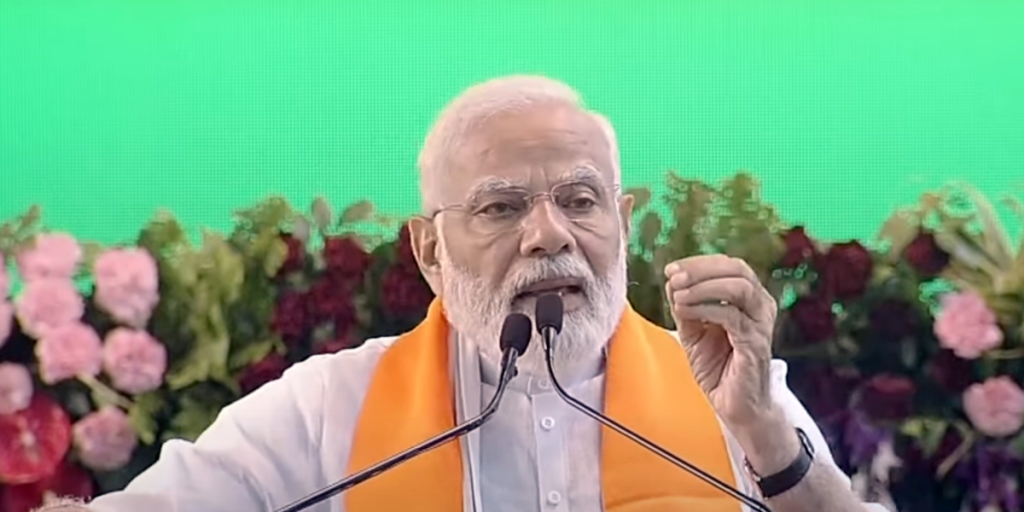The Opposition Stands to Gain More From Modi’s Move to Unify Elections
By offering to reunite central and state elections, Modi has unwittingly offered INDIA a way out of its seat-sharing dilemma.

Prime Minister Narendra Modi. Photo: Screengrab via YouTube/BJP
Opposing any decision that has been sprung on a country by its government without prior discussion is a reflex action among opposition parties in all democracies. So it comes as no surprise that Adhir Ranjan Choudhury, the only member of the INDIA coalition whom the Modi government has invited to join the eight member panel that it is setting up, ostensibly to study but in reality to whitewash, the re-unification of central and state elections, has refused to do so.
Divorced from its present political context, it is difficult to not welcome the proposal to reunite central and state elections. The move will halve the presently crippling electioneering expenses for political parties. And by extension, the need to raise money, much of which has been coming from clandestine and criminal sources ever since the ban former Prime Minister Indira Gandhi put on company donations to political parties in 1970.
Reunification of the Lok Sabha and Vidhan Sabha elections will also make it far easier for a future government to set up a state financed and publicly audited system of election financing. This would not only weaken and, over time, eliminate the nexus between crime and politics in the country, but also open the way for reforms in the police and lower administration that will cleanse the government of corruption and make it serve the people. It would also lengthen the time horizon over which government policies will need to bear fruit; restore the Centre-State co-ordination in policy making that was severely weakened by the separation of central from state elections, and facilitate structural reforms.
If enacted with necessary safeguards, it will also put a brake on opportunistic defections from political parties. The most necessary of these safeguards will be an automatic declaration of President’s rule till the next general election in any state where the government has been brought down by defections.
Prime Minister Modi’s reasons for taking this sudden decision, however, have little to do with better governance. He has taken it because he is aware that the BJP runs the risk of suffering the same fate in the Vidhan Sabha elections in Rajasthan, Madhya Pradesh and possibly in Jharkhand and Chhattisgarh, that it suffered in Karnataka.
He is therefore understandably wary of going into the next Lok Sabha elections with a string of electoral defeats in major states behind him. So he has decided to kill two birds with one stone – avoid four important state elections that his party could lose, and hold a combined national and state election with the prestige of the G-20 presidency and its grand conference in Delhi to buoy him, delivering both the centre and the state to his party.
The INDIA coalition’s lack of enthusiasm for the one-election proposal is therefore understandable. But it is also short-sighted because unifying central and state elections will resolve the most knotty problem that the alliance is facing in the run-up to the next general election and greatly improve its chances of victory. This problem is the allocation of seats to its constituent parties in each state.
As the Mumbai meeting showed, the coalition is determined to field only one candidate against the Bharatiya Janata Party (BJP) in each constituency. But it has yet to decide from which party, and on what basis the candidate should be chosen. At the Patna meeting, West Bengal chief minister Mamta Bannerjee had told the press that the alliance would set up coordination committees that would first decide the principles they would follow in the selection of candidates and then use these to choose the party and candidate for each constituency. Today, two more alliance meetings later, that process is only about to begin.
This foot-dragging is taking place because the party leaders have not found a way to cross the main hurdle they face: how to retain the loyalty and support of their cadres in the constituencies that they have ceded to an ally in the Lok Sabha election.
This problem would not have arisen if there had been a system of state financing of elections like the one Western Europe. In its absence, parties have come to rely on local financiers whom they offer government contracts and other favours if their party comes to power. This clientelist system starts breaking down if the financiers lose faith in the party, or in its candidate’s capacity to win. It ceases to exist when the party has no horse in the race.
By offering to reunite central and state elections Modi has unwittingly offered INDIA a way out of its dilemma. This would confine the seat sharing between political parties only to the Lok Sabha elections, and allow full competition to continue between them sin the various state assemblies and also require them to make a clear demarcation between national and local issues.
Party cadres can then be instructed to emphasise national issues in parliamentary constituencies where their party is fielding candidates for both the Lok Sabha and the Vidhan Sabha, and to place greater stress on state and local issues in those where the Lok Sabha seat has been allotted to another member of the alliance.
